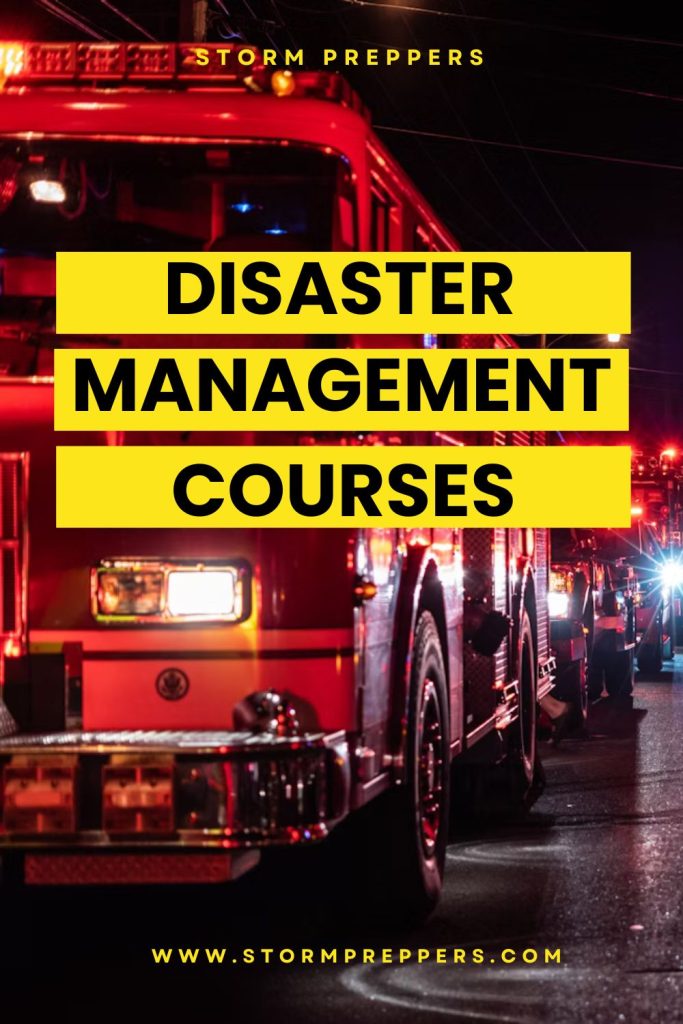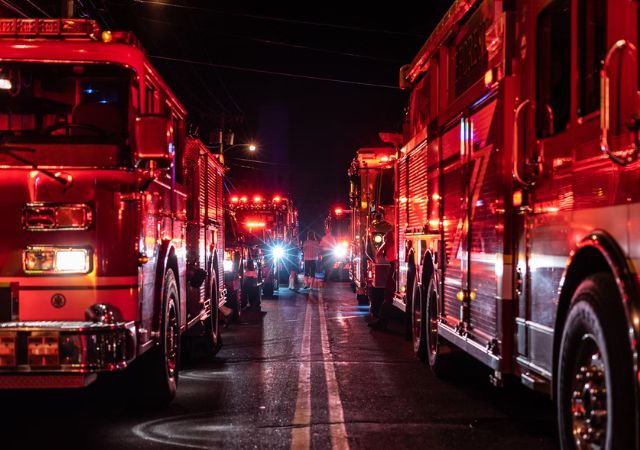There are a variety of disaster management courses available to help you to develop the skills and knowledge required to manage disasters. Many institutions offer courses and training for first responders, emergency managers, or anyone wants to be better prepared for emergencies.
These courses cover a range of topics. Some of the more popular offerings include emergency management, disaster response, crisis communication, and public health. Many courses are available online, making it easy to learn at your own pace and on your own schedule. Some courses may also offer certification or continuing education credits, which can be valuable for professionals looking to gain recognizable accreditation in the field.
To find the most reputable disaster management courses, you must do your research. Finding the right course for you depends on your goals, your level of experience, and the specific topics you want to learn about. With the right course, you can develop the skills and knowledge you need to help keep yourself and others safe in the event of an emergency.
Why Should You Study Disaster Management
Disasters can strike anywhere and at any time, leaving behind a trail of destruction, chaos, and confusion. The need for competent professionals who can manage disasters effectively has never been greater.
Here are some reasons why you should consider studying disaster management:
It Saves Lives
One of the primary reasons why disaster management is important is that it saves lives. When a disaster strikes, people’s lives are at risk, and every second counts. Disaster management professionals are trained to respond quickly and efficiently to minimize the loss of life and property.
It Helps Communities Recover
Disaster management is not just about responding to a disaster; it is also about helping communities to recover from disasters. Disaster management professionals work to ensure that affected communities have access to the resources they need to rebuild and recover from a disaster.
It’s a Growing Field
Given the increasing severity of disasters, the demand for disaster management professionals is on the rise, and it’s expected to continue growing in the coming years. This means that there will be plenty of job opportunities available for those who are interested in pursuing a career in disaster management.
It’s a Multidisciplinary Field
Disaster management is a multidisciplinary field that draws on a range of skills and expertise. Professionals in this field need to have a broad understanding of everything from engineering and logistics to public health and psychology.
It’s Fulfilling Work
Working in disaster management can be incredibly fulfilling. You will have the opportunity to make a real difference in people’s lives and help them to recover from some of the most challenging situations they will ever face.
Disaster Management Subjects
There are various disaster management subjects that you should study to gain a comprehensive understanding of the field. Here are some of the essential subjects that you should expect to encounter in a disaster management course:
Emergency Management
Emergency management is the process of preparing for, responding to, and recovering from an emergency or disaster. This subject covers the fundamental principles of emergency management, such as risk assessment, hazard identification, and incident command.
Disaster Response
Disaster response is a critical subject in disaster management. It covers the immediate actions taken to save lives, protect property, and meet basic human needs in the aftermath of a disaster. Disaster response subjects include search and rescue, first aid, and emergency shelter management.
Hazard Mitigation
Hazard mitigation is the process of reducing or eliminating the risks and impacts of natural or man-made hazards. In a disaster management course, you will learn about hazard identification, risk assessment, and mitigation strategies.
Crisis Communication
Effective communication is crucial during a disaster. Crisis communication is a subject that teaches you how to communicate with various stakeholders during a disaster. This subject covers topics such as public information, media relations, and social media management.
Disaster Recovery
Disaster recovery is the process of restoring communities and infrastructure to pre-disaster conditions. This subject covers topics such as community redevelopment, infrastructure restoration, and economic recovery.
Humanitarian Assistance
Humanitarian assistance is the provision of aid and support to people affected by a disaster. This subject covers the principles and practices of humanitarian aid, including needs assessment, program design, and delivery.
Disaster Management Courses
As a professional in the field of disaster management, it is important to stay up-to-date with the latest techniques and best practices. The best Disaster management courses will provide you with the knowledge and skills you need to effectively respond to disasters and emergencies.
There are a variety of disaster management courses available, each with its own focus and curriculum. Some courses focus on specific types of disasters, such as earthquakes, hurricanes, or wildfires. Others cover more general topics, such as disaster planning, response, and recovery.
Emergency Management Institute (EMI) Courses
Emergency Management Institute (EMI) courses offered by FEMA are also popular disaster management training courses. The overall programme is designed to provide emergency management professionals with the knowledge and skills they need to effectively respond to disasters. Course in the programme cover a wide range of topics, including disaster response operations, disaster recovery, and emergency planning.
DisasterReady.org Disaster Management
Another beneficial course is the DisasterReady.org Disaster Management Course. This course is designed to provide humanitarian workers with the knowledge and skills they need to effectively respond to disasters and emergencies. The course covers a wide range of topics, including disaster preparedness, response, and recovery.
In addition to the courses listed here, there are other courses which may be offered by local institutions. Some courses are offered online, while others are offered in-person. Check your local disaster management agencies for course offerings.
Remember, when selecting a course, it is important to consider your specific needs and goals, as well as the course curriculum and format.
Here are a few disaster management courses available for enrollment:
FEMA: National Disaster & Emergency Management University
UWI Cave Hill: Risk Crisis and Disaster Management
World Bank: Introduction to Disaster Risk Management (DRM)
Kenya Red Cross Training Institute: Diploma in Disaster Management
Disaster Ready: Disaster Management Courses
UNITAR: Master of Disaster Management
University of Pittsburg via Coursera: Disaster Preparedness
UNDRR: Disaster Training Courses
Global Relief Institute: Post Graduate Diploma in Disaster Management
Coventry University: BSc Disaster and Emergency Management
Coventry University: MSc Disaster Management and Resilience
Charles Darwin University: Humanitarian and Disaster Management Courses
University of Wisconsin-Madison: Disaster Management Center
University of Manchester: MSc International Disaster Management
University of Portsmouth: MSc Crisis and Disaster Management
University of South Africa: Programme in Disaster Management
University of Leicester: MSc Risk, Crisis and Disaster Management
Alison: Disaster Management Courses
CMDR COE (NATO): Disaster Courses
FIU: BA Disaster Management
Massey University: Emergency Management Courses
Bournemouth University: International Disaster Management Course
University of Auckland: Master of Disaster Management
University of Johannesburg: Short Learning Programme in Disaster Management
Disaster Management Careers
If you are interested in a career in disaster management, there are many options available to you. As mentioned previously, disaster management professionals are responsible for preparing for, responding to, and recovering from natural and man-made disasters. These professionals work in a variety of settings, including government agencies, non-profit organizations, and private companies.
Here are a few examples of disaster management careers and jobs:
Emergency Management Director
Emergency management directors are responsible for developing and implementing plans to respond to natural disasters, terrorist attacks, and other emergencies. They work with other emergency response agencies to coordinate disaster response efforts and ensure that resources are available to respond to emergencies.
Disaster Recovery Specialist
Disaster recovery specialists are responsible for coordinating the recovery efforts after a disaster has occurred. They work with government agencies and non-profit organizations to provide assistance to individuals and communities affected by disasters.
Hazard Mitigation Specialist
Hazard mitigation specialists work to reduce the risk of disasters by identifying and addressing potential hazards. They work with government agencies and private companies to develop plans and strategies to mitigate the impact of disasters.
Emergency Medical Technician (EMT)
EMTs are responsible for responding to emergency medical situations, including natural disasters and other emergencies. They provide medical care to individuals in emergency situations and transport them to hospitals for further treatment.
Firefighter
Firefighters are responsible for responding to fires and other emergencies. They work to prevent fires from occurring and respond to emergency situations, including natural disasters.
Public Health Specialist
Public health specialists work to protect the health and safety of communities affected by disasters. They work with government agencies and non-profit organizations to develop plans and strategies to prevent the spread of disease and ensure that individuals have access to medical care.
Logistics Specialist
Logistics specialists are responsible for coordinating the transportation and distribution of resources during a disaster. They work with government agencies and non-profit organizations to ensure that resources are available to respond to emergencies.
Communications Specialist
Communications specialists are responsible for coordinating communication efforts during a disaster. They work with government agencies and non-profit organizations to ensure that accurate and timely information is provided to the public.
To find disaster management jobs, visit the following links:
UN Jobs: Jobs for Disaster Management
UN Jobs: Jobs for Disaster Reduction
Relief Web: Disaster Management Jobs
ICF: Disaster Management Jobs
American Red Cross: Careers in Disaster Cycle Services
Caribbean Jobs: Emergency Management Jobs
CDEMA: Opportunities
British Red Cross: Emergency Response Careers
Development Aid: Jobs in Disaster Reduction Sector
Prevention Web: Jobs and Careers in Resilience
FEMA via USA Jobs: Emergency Management Jobs
North Carolina Department of Public Safety: Emergency Management Careers
LinkedIn: Disaster Management Jobs (USA)
LinkedIn: Remote Emergency Management Jobs (USA)
Indeed: Remote Emergency Disaster Management Jobs
Disaster management is a broad field that offers many opportunities for those interested in helping others during times of crisis. If you have a passion for helping others and are interested in a career in disaster management, consider completing a course, which will benefit your career in the field.
Image: Connor Betts via Unsplash

